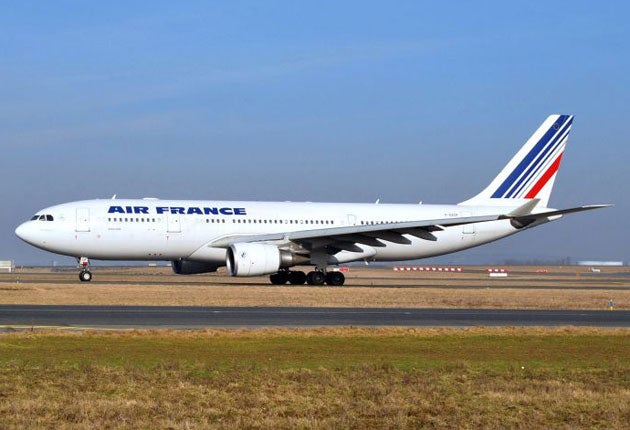UK schoolboy was on board missing Atlantic plane

An 11-year-old prep school pupil was among the five Britons on the airliner that vanished over the Atlantic.
Alexander Bjoroy, who attended Clifton College preparatory school in Bristol, was one of 228 people aboard the missing Air France Airbus A330 aircraft.
A receptionist at the school said: "We are doing all we can to support the family."
As Brazilian and French planes continued to scour the Atlantic searching for the plane, aviation experts stressed the importance of finding the aircraft's "black box" flight data recorder.
The experts also pointed out that it was by no means certain that the plane, flying from Rio de Janeiro to Paris, had been struck by lightning.
Three Irish women, all in their 20s, were also on the plane, which had 12 crew. The 216 passengers included a baby and seven children.
French maritime patrol planes took off from Senegal this morning to look for sings of the lost airliner. Brazilian air force planes have been searching the Atlantic since yesterday.
John Milne, headmaster of Clifton College, said the announcement was made "with deep regret".
He added: "Alexander was returning to England from his half-term break.
"Alexander joined the prep school in January 2009 and was a well-liked and respected boarder who will be sorely missed by his fellow pupils and staff.
"Our deepest sympathies and condolences are with the family in Brazil at this time."
A spokeswoman for the school later confirmed that Alexander held a British passport.
The aircraft had run into stormy weather with strong turbulence around four hours into the flight which had left Rio at around 11pm UK time on Sunday.
About 15 minutes after the turbulence message, an automatic message was received from the plane - AF447 - indicating a failure in the electrical circuit.
Kieran Daly, editor of internet news service Air Transport Intelligence, said it was "absolutely imperative" that the black box flight recorder was found.
He went on: "If it's not recovered we may never know exactly what happened and the implications of this would be enormous.
"You would have had a state-of-the-art plane flown that has just disappeared over the Atlantic. Those involved in the search and investigation will move heaven and earth to make sure the black box is found."
Mr Daly said the chances of finding it were good and pointed to the fact that black boxes had been successfully located in the cases of a 1998 Swissair flight which went down off Canada and in the TWA flight 800 crash in the Atlantic off New York in 1996.
Mr Daly went on: "We really know very little about what happened to the Air France flight. We know the plane flew through stormy weather and there was an electrical problem. But that sort of thing often happens.
"We have no evidence at all that the aircraft was struck by lightning. It really is leaping ahead quite a lot to say that the plane was brought down by lightning.
"That's why it is so important to find the black box and the wreckage. It's almost unheard of not to find wreckage."
One of the British passengers on the flight is believed to be Arthur Coakley, from near Whitby, North Yorkshire, whose wife Patricia spoke to him as he waited for his flight to be called.
The Irish women on the plane were named locally as Aisling Butler, of Roscrea, Co Tipperary, Jane Deasy, of Dublin, and Eithne Walls, originally from Belfast.
The three best friends, who were forging promising careers as doctors, were returning home after a holiday in Brazil with other friends who graduated with them from Trinity College Dublin two years ago. A Welsh woman was also among the group of friends.
Mrs Coakley told the BBC her husband was returning from a four-week stint in Brazil working on an oil rig.
She said: "He had just checked in his luggage and was waiting for his flight to be called. His return date has been cancelled twice but he wasn't supposed to be on this flight."
She said the couple's two sons and daughter were "distraught" although the family was not giving up hope of her "fabulous, kind" husband being found.
Mr Coakley's business partner Ken Pearce said the previous flight which he had hoped to board was full.
Speaking in Tokyo today, Sir Richard Branson, founder of Virgin Atlantic, said news of the missing Air France plane was "horrendous", adding that he could not speculate on what had happened.
He said: "It's horrendous. Air travel is so safe that, when something like this happens, it leaves everybody bewildered."
Pilots flying a commercial jet from Paris to Rio de Janeiro for Brazil's largest airline, TAM, said they saw what they thought was fire in the ocean along the Air France plane's route early yesterday.
Brazilian Air Force spokesman Colonel Jorge Amaral said authorities were investigating the report.
He added: "There is information that the pilot of a TAM aircraft saw several orange points on the ocean while flying over the region... where the Air France plane disappeared.
"After arriving in Brazil, the pilot found out about the disappearance (of the Air France plane) and said that he thought those points on the ocean were fire."
Commander Christophe Prazuck, a spokesman for the French military joint staff, said it was "very unlikely" that any survivors would be found, but added that it was hoped to find an indication of the location where the plane went down by the end of the day.
Search aircraft will scour the area where the TAM pilot reported "orange spots" on the surface of the sea, and will also follow the route which the Air France plane should have taken, he said.
He added that the weather was bad, with poor visibility.
Join our commenting forum
Join thought-provoking conversations, follow other Independent readers and see their replies
Comments